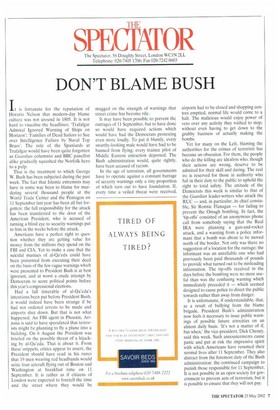SPECIATOR
The Spectator, 56 Doughty Street, London WC1N 2LL Telephone: 020-7405 1706; Fax 020-7242 0603
DON'T BLAME BUSH
It is fortunate for the reputation of Horatio Nelson that modern-day blame culture was not around in 1805. It is not hard to visualise the headlines: 'Trafalgar Admiral Ignored Warning of Ships on Horizon'; 'Families of Dead Sailors to Sue over Intelligence Failure by Naval Top Brass'. The role of the Spaniards at Trafalgar would have been quite forgotten as Guardian columnist and BBC panellist alike gradually squashed the Norfolk hero to a pulp.
That is the treatment to which George W. Bush has been subjected during the past week. The fact that Islamic extremists may have in some way been to blame for murdering several thousand people at the World Trade Center and the Pentagon on 11 September last year has been all but forgotten: the full responsibility for the attack has been transferred to the door of the American President, who is accused of turning a blind eye to security warnings put to him in the weeks before the attack.
Americans have a perfect right to question whether they are getting value for money from the millions they spend on the FBI and CIA. Yet to make a case that the suicidal maniacs of al-Qa'eda could have been prevented from executing their deed on the basis of the few vague warnings which were presented to President Bush is at best ignorant, and at worst a crude attempt by Democrats to score political points before this year's congressional elections.
Had a full timetable of al-Qa'eda's intentions been put before President Bush, it would indeed have been strange if he had not ordered arrests to be made and airports shut down. But that is not what happened. An FBI agent in Phoenix, Arizona is said to have speculated that terrorists might be planning to fly a plane into a building. On 6 August the President was briefed on the possible threat of a hijacking by al-Qa'eda. That is about it. From these snippets, critics appear to assert, the President should have read in his runes that 19 men wearing red headbands would seize four aircraft flying out of Boston and Washington at breakfast time on 11 September. It is rather as if citizens of London were expected to foretell the time and the street where they would be
mugged on the strength of warnings that street crime has become rife.
It may have been possible to prevent the outrages of 11 September, but to have done so would have required actions which would have had the Democrats protesting even more loudly. To put it bluntly, every swarthy-looking male would have had to be banned from flying; every trainee pilot of Middle Eastern extraction deported. The Bush administration would, quite rightly, have been accused of racism.
In the age of terrorism, all governments have to operate against a constant barrage of security warnings only a tiny proportion of which turn out to have foundation. If, every time a veiled threat were received. airports had to be closed and shopping centres emptied, normal life would come to a halt. The malicious would enjoy power of veto over any activity they wished to stop; without even having to get down to the grubby business of actually making the bombs.
Yet for many on the Left, blaming the authorities for the crimes of terrorists has become an obsession. For them, the people who do the killing are idealists who, though their actions are wrong, deserve to be admired for their skill and daring. The real ire is reserved for those in authority who fail in their duty to the public to uphold the right to total safety. The attitude of the Democrats this week is similar to that of the Guardian leader-writers who attack the RUC — and, in particular, its chief constable, Sir Ronnie Flanagan — for failing to prevent the Omagh bombing. In fact, the `tip-offs' consisted of an anonymous phone call from somebody saying that the Real IRA were planning a gun-and-rocket attack, and a warning from a police informant that a bomb was about to be moved north of the border. Not only was there no suggestion of a location for the outrage; the informant was an unreliable one who had previously been paid thousands of pounds to provide what turned out to be misleading information. The tip-offs received in the days before the bombing were no more useful than was the confusing warning which immediately preceded it — which seemed designed to cause police to direct the public towards rather than away from danger.
It is unfortunate, if understandable, that, as a result of bullying from the blame brigade, President Bush's administration now feels it necessary to issue public warnings of possible future atrocities on an almost daily basis. It's not a matter of if, but when,' the vice-president, Dick Cheney, said this week. Such announcements cause panic and put at risk the impressive spirit with which Americans have resumed their normal lives after 11 September. They also distract from the foremost duty of the Bush administration: the continued campaign to punish those responsible for 11 September. It is not possible in an open society for government to prevent acts of terrorism, but it is possible to ensure that they will not pay.






















































































 Previous page
Previous page